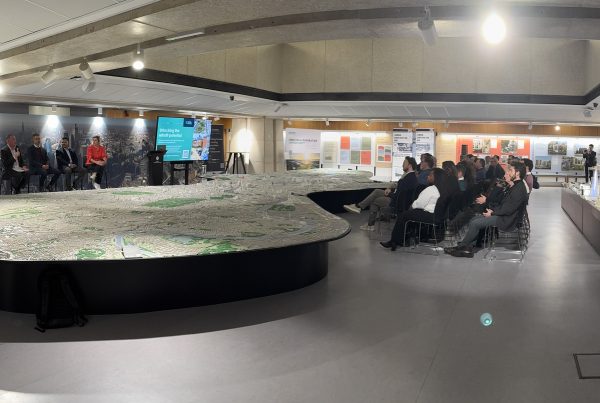
Sustainability is becoming a growing priority in the construction industry. While eco-friendly designs and construction practices may have once been considered a trend, they are now essential for long-term environmental and economic viability. With the world focusing on ways to combat climate change, construction is an industry with one of the largest impacts. Sustainable construction has so many benefits and is hugely important to both the local community and global initiatives in sustainability. The influence of sustainable construction covers so many areas that its level of importance is extremely significant. Companies and their associated construction sites must put effort into sustainability, not only to comply with constantly evolving regulations but to prioritise the future needs of their business, the eventual consumers and planet Earth.
What does Sustainable Construction Mean?
Sustainable construction refers to the design, development, and operation of buildings in a way that prioritises environmental, economic, and social responsibility throughout their lifecycle. By designing and developing buildings through sustainable methods and practices, negative environmental impacts are minimised and the structures that are developed continue to be environmentally-friendly throughout their lifetime.
Sustainable construction involves the use of eco-friendly construction products during the build period including recycled and natural materials, conserving energy throughout the project and reducing the level of waste that comes from development. Sustainability not only applies to the construction period but also includes implementing infrastructure into the buildings that will help the development continue to be sustainable into the future. Sustainable construction is about building structures that not only meet current needs and regulations but also ensure future generations have access to a clean and sustainable environment. Sustainable construction supports global efforts to reduce carbon emissions and contributes to the transition toward net-zero targets by 2050. Sustainable construction encompasses everything from how the company operates to the final product, including deliberate design, how the construction site functions, the materials the building is made from and the methods of how it is built.
How is Sustainability Monitored in the Construction Industry?
Any company within the construction industry has to ensure current compliance with regulations and meet sustainability guidelines. This compliance allows construction sites to continue operation, bringing infrastructure into the local community. However, many companies strive to exceed compliance with their own goals in sustainability. These companies have a competitive edge in a world that is continuously focused on environmentally-friendly practices. While it is important that construction companies are sustainable to comply with current regulations, it is even more important for them to excel with their commitment to not only benefit their business but also have a greater influence on combating climate change and a lower impact carbon footprint.
Common Assessment Standard
The Common Assessment Standard (CAS) is a widely recognised UK pre-qualification standard that ensures construction companies comply with regulations in key areas such as safety, quality, and environmental management. While it includes sustainability considerations, it is not solely focused on environmental impact. As a recognised construction accreditation, the CAS ensures that operating construction companies are up-to-date and meet current requirements while working towards upcoming regulation changes. While the main focus of the Common Assessment Standard is 12 key areas of risk management, it also includes an analysis of whether companies are taking proactive steps to reduce their negative environmental impact. Compliance is essential for gaining accreditation and the right to continue operation. By implementing the Common Assessment Standard, the compliant companies are highlighted while environmental efforts are showcased to existing and potential clients.
ISO 14001
ISO 14001 is an accreditation that applies to all industries but is especially important for the construction industry to have. ISO 14001 is an international standard that helps businesses and organisations manage their environmental impact and reduce their carbon footprint. This management is a standard for businesses and helps companies to comply with environmental law, improve their environmental efforts and prioritise sustainable objectives. All types of companies can use the framework but for construction companies, it can improve resource efficiency, minimise energy consumption, lower waste, reduce costs and help businesses gain a competitive edge.
BREEAM
When it comes to green building certification, BREEAM is the one of world’s oldest method of analysing and certifying a building’s sustainability. Science-based to create more sustainability in the construction industry, companies that receive BREEAM accreditation are industry leaders in sustainability. Buildings that are certified align with BREEAM’s approach to prioritise net zero goals, public health and ESG. BREEAM certification is especially important as it considers not only the development stage but the whole life performance and impact of a building.
Why is Sustainable Construction Important?
The benefits of sustainable construction create an extensive list but there are certain advantages of sustainability in the industry that make it exceptionally important.
Global Environmental Impact
The construction and building sector is a significant contributor to global carbon emissions, accounting for around 39% of total emissions, making sustainable practices crucial for mitigating climate change. With conventional construction responsible for a significant percentage of the world’s carbon emissions and a high proportion of energy usage, sustainable construction is extremely important to conserve resources and reduce the industry’s carbon footprint. Sustainable construction reduces environmental impact by improving energy efficiency, minimising waste, and using recycled building materials, contributing to broader climate mitigation efforts.
Resource Preservation
There is an increasing importance on preserving resources for future generations and sustainable construction can help protect these. By incorporating recycled materials and sustainably sourced natural products, sustainable construction reduces reliance on finite natural resources and lowers overall environmental impact
Energy Conservation
By reducing energy consumption and introducing renewable energy to construction sites, the industry can significantly reduce its carbon footprint. Considering the whole life performance of buildings, sustainable construction aims to reduce carbon emissions through energy efficiency and renewable energy integration, supporting long-term sustainability goals.
Public Health
Pollution is one of the most significant contributors to our health and sustainable construction can enhance the quality of our environments. By reducing emissions and using non-toxic materials, sustainable construction improves air quality both outdoors and indoors, reducing pollutants and enhancing occupant health. Water quality is also enhanced while introducing natural lighting indoors not only improves energy efficiency, it also has a significant impact on mental well-being. Sustainable construction supports both physical and mental health in many areas while also protecting the health of wildlife and natural biodiversity, ultimately having a positive impact on public health as a result.
Economic Benefits
Aside from its huge environmental contribution, sustainable construction has huge economic benefits. Companies that prioritise energy efficiency benefit from lower operational costs, and sustainably designed buildings can provide long-term utility savings for occupants. Sustainable buildings often retain their value better than conventional buildings, as they align with increasing market demand for energy-efficient and environmentally friendly properties.



